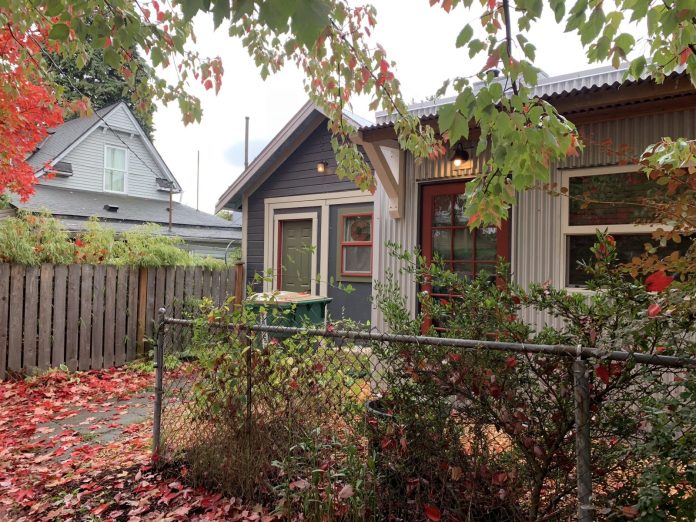
Oregon passed statewide missing middle housing reform in 2019, as did California in 2021. Hopes were high that Washington State would follow suit in 2022 with HB 1782. Unfortunately, that will not be the case. Despite the full backing of Governor Jay Inslee and a poll showing strong public support for statewide missing middle housing reform, the Democratic-controlled legislature failed to garner enough support to get the bill for a floor vote before the house of origin bill cutoff on Tuesday.
So it appears for now, Washingtonians will not be seeing the duplexes, triplexes, and quadplexes that would have been possible to create under the bill arriving soon in their neighborhoods.
After acknowledging the bill’s demise, house sponsor Rep. Jessica Bateman (D-Olympia) tried to maintain a positive attitude. “Less of a goodbye. More like, we’ll see you soon,” she tweeted in response to supporters’ laments.
News that the bill would not make it to a floor vote came fairly quickly after an update that its impacts would be reduced from a half-mile from major transit stops to a quarter-mile. This rollback came after other compromises were made limiting the legislation’s impact in order to win more lawmaker support. Unfortunately these changes were not enough to strike a winnable deal for many legislators, who Bateman described in another tweet as being concerned about local control.
The local control counterargument arose early on during public hearings on the bill. Elected representatives from Tacoma, Auburn, Federal Way, Renton, Spokane Valley, Covington spoke against the bill, largely on the argument that it would undermine planning efforts already under way in their jurisdictions.
Mayor Nancy Backus of Auburn was one of the elected officials to testify against the bill, arguing that Auburn already had a “great plan moving forward for all types of affordable housing, both in ownership and rental opportunities.” Backus referenced how the city had approved waiving impact fees and height restrictions on parcels near the Sounder commuter rail station as evidence that it was welcoming density. However, her concerns about the bill’s impact on the city’s capital facilities, utilities, and police force were exaggerated, making it seem like it would result in more growth, and strain, than would result from a bill modestly increasing density in single-family zoned areas.
While the defeat of missing middle housing reform was a blow for many housing advocates, there are still some very good bills still in play as the short session speeds ahead. One of those is HB 1660, a bill that would legalize accessory dwelling units, like mother-in-law units and backyard cottages, statewide. The legislation would also prevent owner-occupancy requirements and the other imposition of unnecessary restrictions. The bill just barely squeaked by in a 50-48 house victory, which makes its future far from certain. Still the fact that it will move on to the Senate and might make it across the finish line provides some silver lining at a disappointing moment.
The Democrats who voted against the accessory dwelling unit bill were Reps. Tana Senn (Mercer Island, 41st Legislative District), Larry Springer (Kirkland, 45th Legislative District), Lisa Callan (Issaquah, 5th Legislative District), Steve Kirby (Tacoma, 29th Legislative District), Bill Ramos (Issaquah, 5th Legislative District), Amy Walen (Kirkland, 48th Legislative District), and Alicia Rule (Blaine, 42nd Legislative District). It’s likely this same group offered resistance to HB 1782, since backyard cottages are an even gentler and lower scale form of the missing middle housing offered in 1782. Obviously a few more Representatives joined them to block the bill. In committee, Rep. Senn sponsored an amendment reducing allowed housing types from sixplexes to fourplexes, confirming her reticence.
Another bill endorsed by The Urbanist, HB 1769, which would immediately sunset the Houghton and East Bellevue Community Councils, passed the House in a rather resounding 71-27 vote. It advances to the Senate and has been referred to Housing and Local Government Committee.
Meanwhile, HB 1880, which would authorize cities and counties to establish Housing Benefit Districts, was deemed necessary to implement the budget, which makes it immune to bill cutoffs, giving it until the end of session on March 10th to get hashed out. It relies on sales tax credits from the state to get started in four pilot cities of Tacoma, Everett, Renton, and Shoreline. The bill is in House Committee on Finance, with an executive session scheduled on February 17th. Read Ron Davis’s primer for more on how this could jumpstart affordable housing creation.
A bill requiring six month notice for rent increases of 7.5% or more — HB 1901 — died in the House after not getting called to a floor vote. Since the Washington State Legislature banned rent control statewide in the early 1980s, this bill had offered a moderate step to providing tenants some protection and relief in a supercharged market. Oregon led the way and passed statewide rent stabilization in 2019, but Washington State has again lagged its neighbor to the south on housing issues.
Two election reforms bills also died in the house on Tuesday. HB 1727 would have moved local elections to even years to increase voter participation rates and HB 1156 would have allowed ranked choice voting in local races.
On a more positive note, HB 1770, which would push the state energy building codes toward greener net-zero standards, passed the House and moved over to the Senate. Governor Jay Inslee requested the bill as part of his climate action strategy. Its first public hearing is scheduled in the Senate Committee on Environment, Energy, and Technology on February 17th at 10:30am.
Bills do not maintain their comments when they leave their chamber of origin, so even if you have expressed support for these bills in the past, now is a great time to take a moment to comment on them on the legislation website.


